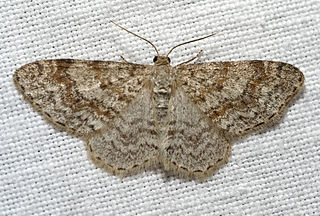
Asthena is a genus of moths in the family Geometridae.

Hydrelia is a genus of moths in the family Geometridae erected by Jacob Hübner in 1825.

Asthenini is a tribe of geometer moths under subfamily Larentiinae first described by Warren in 1893. The tribe has been combined with Eupitheciini in the past, most notably by Jeremy Daniel Holloway in his work The Moths of Borneo.

Hydrelia flammeolaria, the small yellow wave, is a moth of the family Geometridae. The species was first described by Johann Siegfried Hufnagel in 1767 It is found in most of the Palearctic realm, from western Europe to Japan.
Hydrelia percandidata is a moth in the family Geometridae. It is found in Transcaucasia and the Caucasus, as well as in Iran and Turkey.

Hydrelia condensata is a moth in the family Geometridae. It is found in North America, including Indiana, Maryland, Massachusetts, Minnesota, New Brunswick, New Hampshire, Ohio, Pennsylvania, Quebec, Tennessee and West Virginia.

Hydrelia bicolorata is a moth in the family Geometridae first described by Frederic Moore in 1868. It is found in China and Sikkim, India.
Hydrelia flammulata is a moth in the family Geometridae first described by Max Bastelberger in 1911. It is found in China.
'Hydrelia' flavidula is a moth in the family Geometridae first described by William Warren in 1907. It is found in Papua New Guinea.
Hydrelia fuscocastanea is a moth in the family Geometridae first described by Hiroshi Inoue in 1982. It is found in Nepal.
Hydrelia latsaria is a moth in the family Geometridae first described by Charles Oberthür in 1893. It is found in China.
Hydrelia lineata is a moth in the family Geometridae first described by William Warren in 1893. It is found in China, Nepal and Sikkim, India.
Hydrelia marginepunctata is a moth in the family Geometridae first described by William Warren in 1893. It is found in China, Nepal and Sikkim, India.
Hydrelia rufigrisea is a moth in the family Geometridae first described by William Warren in 1893. It is found in China and Sikkim, India.
Hydrelia sericea is a moth in the family Geometridae first described by Arthur Gardiner Butler in 1880. It is found in China, Nepal and the north-eastern Himalayas.
Hydrelia shioyana is a moth in the family Geometridae first described by Shōnen Matsumura in 1927. It is found in Japan and Russia.
Hydrelia subcingulata is a moth in the family Geometridae first described by Hiroshi Inoue in 1987. It is found in Nepal and China.
Asthenotricha argyridia is a moth in the family Geometridae first described by Arthur Gardiner Butler in 1894. It is found in the Democratic Republic of the Congo, Kenya, Rwanda and Uganda.
Asthenotricha candace is a moth in the family Geometridae first described by Louis Beethoven Prout in 1929. It is found in Ethiopia.
Asthenotricha costalis is a moth in the family Geometridae first described by Per Olof Christopher Aurivillius in 1910. It is found in Kenya and Tanzania.





